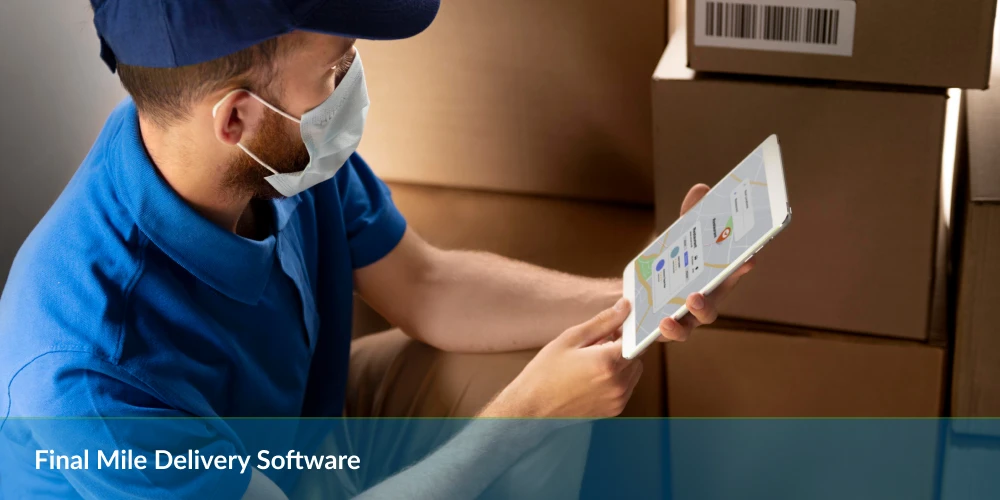Table of Contents
Over the past few years, the logistics and delivery industry has witnessed a transformation with the introduction of Artificial Intelligence (AI) and related technologies.
In a report published by Precedence Research, the size of global artificial intelligence (AI) in the transportation market was evaluated at USD 2.3 billion in 2021 and is expected to cross USD 14.5 billion by 2030.
The growing stature of AI in optimizing delivery operations proves that it is pivotal in improving customer satisfaction and providing a competitive edge to companies in the delivery industry.
In this blog, we will discuss how AI has turned out to be a disruptive technology and its role in impact in transforming delivery operations.
So let’s begin.
How AI Transforms Delivery Operations
AI has been incremental in transforming delivery operations, starting from the planning stage: where algorithms can optimize delivery routes and minimize delivery time, to enabling businesses to create a more precise delivery schedule and reducing the risk of delayed shipments and saving valuable time.
By using advanced machine learning algorithms, businesses are now capable to analyze large volumes of data in real-time. The insights generated from this data can help you understand customer preferences, market trends, delivery performance, and more.
The Role of AI in Delivery Operations is not just limited to streamlining the delivery process, but it extends to aspects such as inventory management, route optimization, predictive maintenance, and customer satisfaction as well. So, let’s have a look at the role of AI in transforming these aspects individually.
Role of AI in Inventory Management
Inventory management is one of the most critical aspects of delivery operations. AI can play a major role in optimizing inventory levels, reducing wastage, and improving efficiency. Here’s how:
- Real-time Tracking: AI can track inventory and respond to changing demand trends in real-time, which translates into increased efficiency, reduced stockouts and improved customer satisfaction.
- Demand Forecasting: AI can also predict demand patterns and help you adjust your resources accordingly. This can help you avoid overstocking or understocking of inventory, reducing the need for overtime, and minimizing transportation expenses.
- Automated Reordering: AI-driven delivery management systems can automatically place orders when an item stock falls below a specific threshold. This again helps you reduce stockouts, and increase customer retention.
Role of AI in Route Optimization
Route optimization is one of the most important benefits of using AI in delivery operations. It helps you optimize your delivery routes in real-time, taking into account multiple variables such as traffic, weather, and road closures, resulting in:
- Cost Reduction: AI-driven route optimization helps your business minimize transportation costs by identifying the most efficient routes for vehicles, based on real-time traffic data, weather conditions, and delivery schedules.
- Improved Customer Satisfaction: It also ensures on-time delivery of goods, reducing delivery times and minimizing delays. This leads to increased customer satisfaction and loyalty.
- Sustainability: AI-powered route optimization helps your company to reduce its carbon footprint by minimizing the distance traveled and fuel consumption, promoting eco-friendly delivery practices.
Role of AI in Predictive Maintenance
Predictive maintenance ensures your delivery vehicles always stay in top condition. By helping you know which vehicles require maintenance, you can reduce the risk of unexpected breakdowns and downtime. Here’s how it works:
- Predictive Maintenance: AI-powered predictive maintenance analyzes data from different sources, such as vehicle sensors and maintenance records, to predict when a vehicle requires maintenance. This helps you minimize maintenance costs and improve vehicle reliability.
- Improved Equipment Performance: By identifying patterns in equipment behavior and making recommendations for optimal maintenance schedules, you can ensure improved equipment performance and extended lifespan.
- Reduced Downtime: Predictive maintenance helps reduce vehicle downtime by identifying potential issues before they become serious problems. This results in improved fleet efficiency and customer satisfaction.
Role of AI in Customer Satisfaction
Customer satisfaction directly influences a company’s success as satisfied customers are more likely to continue doing business with a company, leading to increased revenue and growth. With an AI-powered delivery management solution, you can transform your customer satisfactions levels by:
- Personalized Service: AI-powered delivery management systems can analyze your customer data and identify specific preferences and needs, allowing you to provide personalized services tailored to each customer.
- Real-time Updates: By providing real-time updates on delivery status, you can give your customers more control and transparency over the delivery process.
- Customer Feedback Analysis: You can also use AI-powered delivery management solutions to analyze customer feedback and identify areas of improvement. This will help you make necessary changes to improve customer satisfaction and loyalty.
The NetworkON Advantage
The Role of AI in Delivery Operations is becoming increasingly important as companies seek to stay ahead of the competition by providing faster, more efficient, and more reliable delivery services.
NetworkON leverages robust AI-driven solutions to optimize delivery operations, improve customer satisfaction, and provide a competitive edge in the delivery industry. We also promote informed decision-making, helping you achieve your business goals faster and increase ROI.
To learn more, email us at info@networkon.io or visit our website.
Frequently Asked Questions:
Can AI help reduce delivery times?
Yes, AI-powered route optimization systems can optimize delivery routes in real-time, taking into account multiple variables such as traffic and road closures. This results in faster and more efficient deliveries.
Can AI help reduce delivery costs?
Yes, AI-powered inventory management systems can help companies optimize their inventory levels, reducing waste and minimizing costs. AI-powered route optimization systems can also reduce fuel consumption and increase driver productivity, resulting in reduced delivery costs.
Can AI help improve customer satisfaction?
Yes, AI-powered chatbots and virtual assistants can handle customer queries and complaints quickly and efficiently, resulting in improved customer satisfaction. AI-powered route optimization systems can also improve delivery times, resulting in increased customer satisfaction.
Is AI reliable for predicting maintenance requirements?
Yes, AI-powered predictive maintenance systems can analyze data from various sources, such as vehicle sensors and maintenance records, to predict when a vehicle requires maintenance. This results in improved vehicle reliability and reduced downtime.
Can AI help reduce vehicle breakdowns?
Yes, AI-powered predictive maintenance systems can identify potential issues before they become serious problems, reducing the risk of unexpected breakdowns.
Can AI completely replace human workers in delivery operations?
No, AI is not intended to replace human workers in delivery operations. Instead, AI is designed to augment human workers by providing them with tools and insights that enable them to work more efficiently and effectively.





0 Conversations